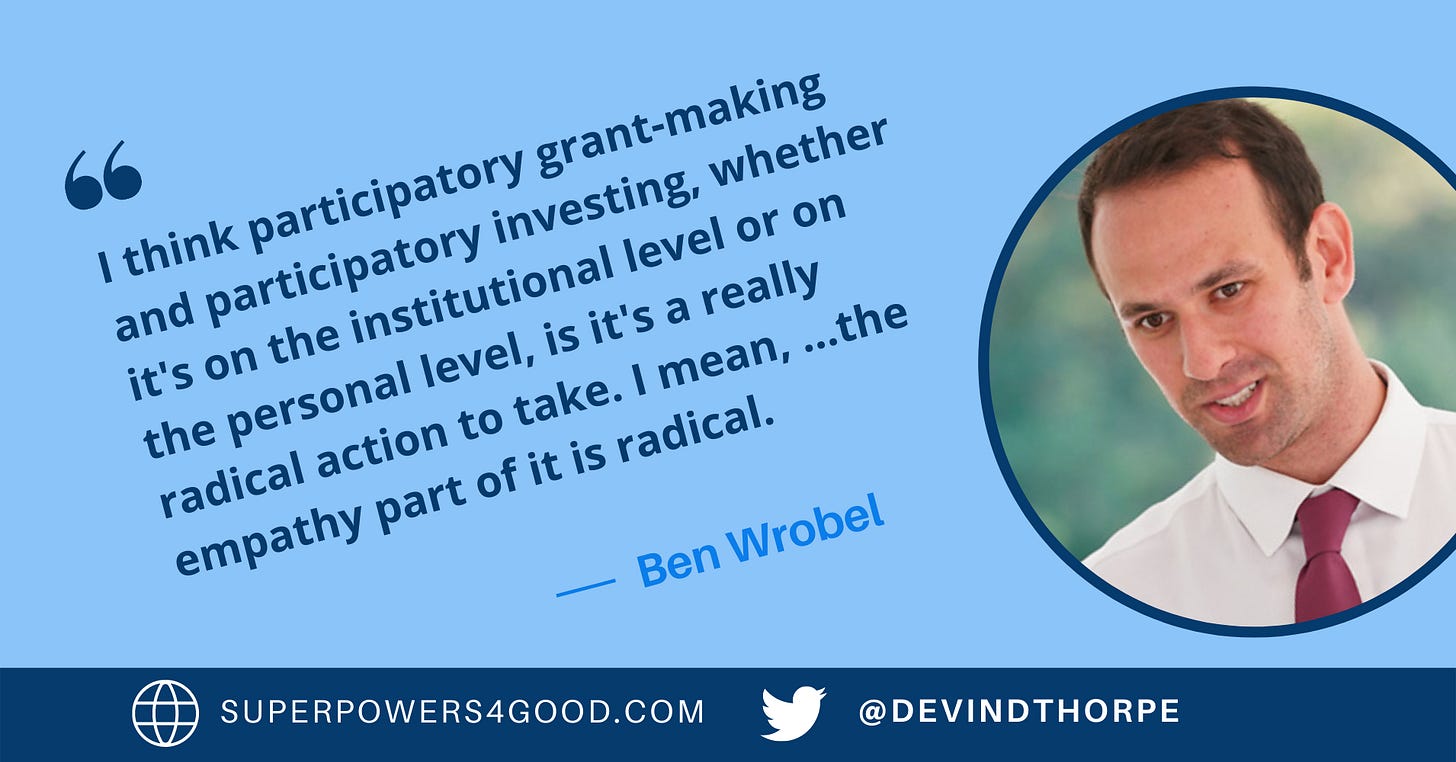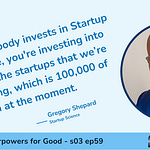Devin: What do you think of as your superpower?
Ben: I think I had a really interesting experience coming out of college. I grew up in, you know, upper-middle-class suburbs in New York of New York City. Then after college, my first job I got by happenstance was as an intern for the National Office of the NAACP. I was often the only white person in the room, which is just not an experience that I think a lot of my peers have ever had. I don’t know how to translate that into a superpower, but I think a level of empathy, a level of humility, understanding that while I have some great ideas, they’re just ideas.
Devin: Meg, what do you think of as your superpower?
Meg: I’m going to also say empathy, but I have a different life experience than Ben. I mean it in a slightly different way. I see my superpower as having the ability to help people tell their stories.
Ben Wrobel, director of communications at Village Capital, and Meg Massey, a freelance journalist, have partnered to author a seminal new work called Letting Go: How Philanthropists and Impact Investors Can Do More Good by Giving Up Control.
Meg summarizes the book succinctly: “We talk about how funders can and should integrate the people that they’re hoping to serve and support with their funding into the decision-making process.”
There are two distinct audiences for the book, philanthropists and impact investors. While many do both, the two activities are treated mainly as two separate disciplines. Ben notes that the authors struggled about whether to include both but did because “a lot of the general principles are the same.”
Village Capital is known for its unusual funding model. Ben explains:
The model we have is called peer-selected investment, and we bring together 12 entrepreneurs that are working in the same sector, but not direct competitors. Twelve African entrepreneurs working on fintech, for instance. We put them through a training investment readiness program. Everyone gets a benefit out of it. But at the end of the program, the group engages in this very open, transparent ranking process and ultimately selects two of their peers to receive funding from our fund.
Village Capital was formed to address a related problem in the venture capital community. “The reason village capital was created by Ross Baird and others early, early on was because venture capital, they argued, was a very closed off hegemonic sphere where a few people in a few cities are making decisions about our collective future,” Ben says.
He notes, however, that Village Capital’s approach is different from the model he and Meg document in the book. “The mechanics of it are more about asking social entrepreneurs to make decisions rather than, let’s say, people living in a specific community or people with disabilities like we’ve seen with some other participatory funding models.”
Meg notes that this has been a blind spot for impact investors. “Impact Investing has largely been about what you’re investing in and not how you’re doing it, that process. And there’s a lot of top-down.”
The nonprofit arena has a similar problem, Ben says. “Philanthropy is largely male, largely white, largely based in a few places. Any sort of funding model where the people making decisions aren’t necessarily representative of the world at large is where participatory funding can be helpful.”
Participating can be difficult, Meg notes. “If you haven’t taken the economics class, if you haven’t worked at a bank or just had any professional experience in finance, something—‘cap size,’ ‘market share’—like these are normal terms for investors, but they can be really intimidating to people who aren’t part—who don’t live and breathe that work.”
Meg and Ben connected at the GIIN conference for impact investors in Amsterdam. Together, they saw a problem. “There’s a panel on support in sub-Saharan Africa that’s like five white guys from Europe,” Meg says.
The book set out a nine rung ladder investors and philanthropists can climb to move from traditional to fully participatory models. Ben summarizes the process as three key steps.
“At the very bottom there, you have a process that’s not participatory; it’s you simply make a decision and then move on with your life,” Ben says.
“Up in the middle of the ladder is what we call consulting,” Ben explains. “Sometimes at its worst, it’s maybe token listening where you’re saying, ‘Hey, we’re going to hold a community meeting. We’re going to invite folks to join a zoom and weigh in on our investment strategy.’ But ultimately, there are no teeth to that.”
“The top rung is true participation, and really the distinction there goes beyond listening,” Ben says. “It means that there is a mechanism in place for community members, for people who have lived experience to have a vote. In its purest form, it’s going to be a decision about who you invest in.”
Meg provided an example. Mama Cash is a grantmaking organization that transitioned to becoming fully participatory. “They found that their staff, rather than kind of being grant analysts and making all these decisions, were facilitating the process of having their current and former grantees review applications and vote. They were given this role, and they were also trained in how to do it.”
The participatory approach is snowballing, Meg says. “Ben and I were interviewing different participatory grantmakers around the world. They started a Google Group, which then turned into a Slack community, which went from those dozen people, now over seven hundred members around the world.”
Empathy is a superpower both Meg and Ben use to enable their work.
How You Can Develop Empathy As a Superpower
Ben sees empathy as being a radical step for investors and grantmakers.
I think participatory grant-making and participatory investing, whether it's on the institutional level or on the personal level, is it's a really radical action to take. I mean, we try not to frame it as radical because, at the end of the day, it is just grant-making. It's not rocket science. But the empathy part of it is radical.
Doing participatory funding “is a radical act of empathy,” he adds.
Ben sees a foundational problem in his peer group.
A lot of young people have the idea of wanting to save the world. There's a problem out there. It can be solved. And if it can be solved, it can be solved by the power of your own intellect. Just like a homework assignment at a liberal arts college, right? It's the perfect attitude for a generation raised on the like the optimism of the “West Wing” and the clean logic of “Freakonomics.”
Ben sees this as arrogance that can impede finding more effective solutions, something he now recognizes in himself. “I’ll suddenly just get really into [a solution to a problem] and push and say, ‘This is what we need to be doing. This is it. Let’s go for it.’ And I forget that five days before, I knew nothing about this topic and still only have a third-hand understanding of it.”
Humility and empathy enable a more inclusive approach that puts decision-making closer to the beneficiaries.
Meg uses her empathy superpower to help other people tell better stories. She offers some storytelling advice. “You always have a beginning, middle and end, which seems obvious. You’d be surprised at how many stories are missing one of those components.”
Then she notes that building tension is a critical element of a story. “What keeps us reading thrillers or watching TV shows is they build up what’s going to happen.”
“The best writers for television, they’ve mastered managing that tension,” she adds.
Grantwriters face significant challenges today. One complained to Meg about the labor-intensive forms and seemingly irrelevant questions. “We don’t speak the same language.”
“Storytelling is a universal language,” Meg says.
If you work at implementing steps to activate your empathy, like Meg and Ben, you can make it a superpower that can influence every other skill you have, enabling you to have more significant impact.














